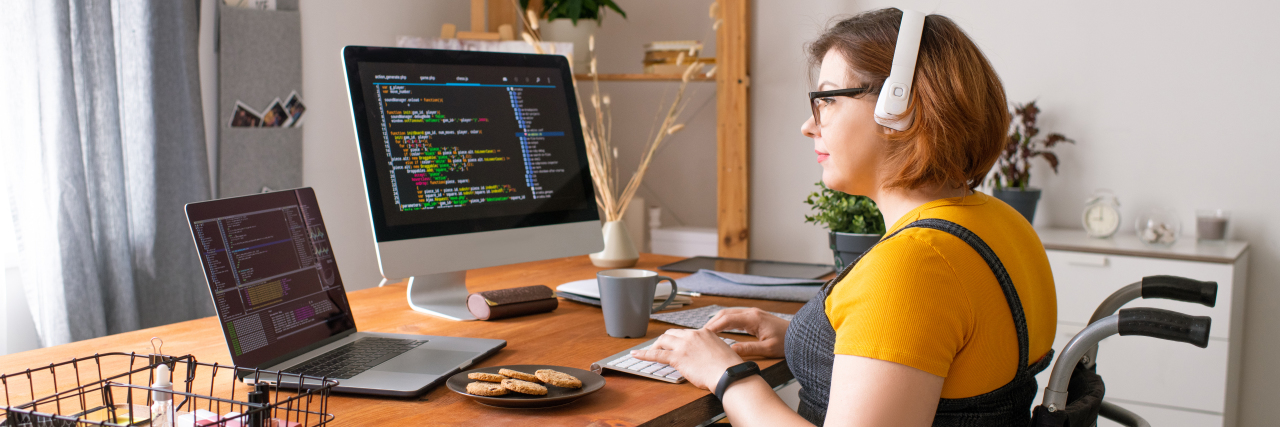How the Pandemic Made Work Accessible to Me as a Person With Cerebral Palsy
I’ve had cerebral palsy (CP) since birth, and I’ve been a wheelchair user since the age of 3. Even when I was young, I recognized that my wheelchair held me back a bit — I couldn’t go on bouncy castles at birthday parties and I couldn’t go on overnight school trips, for instance — but it never really bothered me. It was just the status quo. Other wheelchair users had similar experiences, so it was fine. It was just part and parcel of living my life on wheels.
As I got older, particularly in my senior year of high school, it started to bother me a little bit more. I felt a little left behind as seemingly everyone around me was getting a part-time job in malls or superstores. They were able to spend their weekends working and apparently enjoying this rite of passage from child to adult; I couldn’t. The physical restrictions of my disability meant that I couldn’t take on a part-time job and very quickly, I started to become envious of the people who could work. This may seem strange to some people. Why on Earth would I be envious of young people giving up their weekends to do long hours for very little money? It’s simple really: they could choose whether or not they wanted to take on a part-time job and I couldn’t. I was envious of the fact they had a choice and didn’t face any restrictions as I did. Then 2020 happened and suddenly everyone faced restrictions as I did.
The pandemic has been the most harrowing time of my life in many ways. Watching the case numbers and death tolls climb at an alarming rate was heart-breaking. Behind the numbers, there were lives and stories, but this seemed to be forgotten in the overwhelming panic. There was a virus that was wrecking lives, societies and communities, and there was nothing anyone could do about it. However, there was also something special in the way that people adapted to their temporary way of living. In the face of heavy restrictions, people reacted by moving most areas of life online.
Suddenly, it felt like I was on a level playing field with my peers. I no longer had to feel envious of those with part-time jobs as there were plenty of opportunities to volunteer online. The monetary aspect didn’t bother me and never had. In a time where everyone was facing hardship, it felt good to be able to do something positive for my community. I joined my peers volunteering in education and for once my disability didn’t get in the way. I didn’t have to ask if the location was wheelchair accessible and had an accessible toilet, I could just get on with the job without worrying whether I would need to ask for help with anything. In fact, most of my colleagues still don’t know that I have a disability because there’s never been a time where it’s felt pertinent to mention it.
The experience of having no additional barriers to employment compared to my peers was refreshing and novel. Then restrictions started to lift, and I thought that would be the end of it — back to in-person, inaccessible employment. I was wrong. I plucked up the courage to voice my fears to my family, my friends, and eventually my manager. It was tricky, and nerve-wracking, but never embarrassing. I will never allow myself to feel embarrassed about my needs. It turns out that, like many companies, it was decided that my role will continue to be online even after the pandemic. So here I am writing this, a student, a volunteer and a proud person with a disability.
If you have any fears that life will become more inaccessible after the pandemic as I did, my advice is really simple: don’t suffer in silence. Tell someone you trust that you’re worried about certain aspects of life returning to how they were pre-pandemic. Don’t feel embarrassed about admitting it. It doesn’t mean you don’t acknowledge the devastation of the pandemic, or that you’re saying you enjoyed lockdown, you are simply expressing a desire for a positive change to stick around. We are all human and I guarantee you, there will be more people who share your worries. Look at it this way: by expressing your desire for a positive pandemic change to stick around, you are expressing a desire to find light from this dark period in human history.
Getty image by Shironosov.

